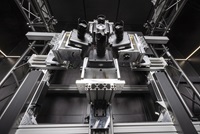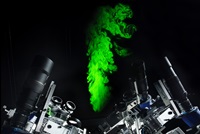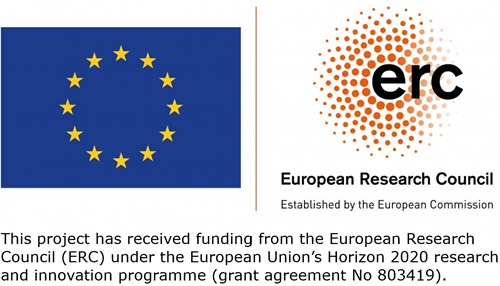Course Content
The course content is focused on non-equilibrium turbulence, advanced analysis methods and related experimental studies at the DTU Turbulence Research Laboratory. The main topics are:
- Review of the main classical views of turbulence, including
- The Kolmogorov/Richardson/Batchelor (K41) equilibrium theory
- Rapid Distortion Theory
- Classical approaches to understanding turbulence
- Historical and more recent developments of non-equilibrium turbulence research
- Experimental/computational approaches used @ DTU TRL (including design tools for design of PIV/PTV experiments)
- Proper Orthogonal Decomposition (POD) techniques and developments at the DTU TRL
The course includes a tour of the newly established DTU TRL laboratory facilities at DTU Construct.

Student target group
The course is intended for PhD-students and PostDoctoral students as well as MSc-students and anyone in academia or industry that has an interest in (non-equilibrium) turbulence, advanced experiments and/or advanced analysis tools for turbulence research. The participants should have general knowledge of fluid mechanics/turbulence and basic Python programming. We will cover the basic principles behind the POD method as well as those of optics necessary to attain a basic understanding of the course content. The course has an upper limit of 30 participants.
Course Credits and Expected Work Load
With assignments, the course corresponds to a total of 3 ECTS credits, or 84 hours (pass/no pass). A course certificate can be provided upon request and finalized course with active participation: Please fill the following form and write 'specialized course with Clara Marika Velte' in the field "Course number and title (1)".
Activities to obtain ECTS credits:
At the beginning of the course, you will give a 5 minutes poster presentation of your PhD-project. The course work will also include one of the following, depending on the main interest of the student:
- POD analysis of measurement data from the DTU TRL lab facilities. A guiding script in Python will be made available.
- Design of a planar or volumetric (laser or LED based) experiment for turbulence measurements.
Based on the chosen task from the list above, you will write a report (in the form of a "paper", 5 pages) as part of the course work. This is to be submitted by 3 weeks after the course end (May 30).
It is of course also possible to attend the course and lectures without earning course credits.


Preliminary Program
Monday, May 12:
08.30-09.00 Registration
09.00-09.30 Course introduction (Clara Velte)
09:40-12.00 Participant poster presentation
12.00-13.00 Lunch
13.00-14.00 The classical view of turbulence and the need for an updated description (Clara Velte)
14.00-15.00 Tour of the laboratory facilities
15.15-17.00 Historical/recent developments of non-equilibrium turbulence research (Clara Velte)
Tuesday, May 13:
09.00-10.00 Introduction to POD with exercises (Martin Schiødt)
10.00-11.45 POD formalism (Peder J. Olesen)
11.45-13.00 Lunch
13.00-13.45 Dissipation POD (Peder J. Olesen)
13.45-14.00 Coffee / Tea break
14.00-15.00 Temporal POD / Particle POD with exercises (Martin Schiødt)
15.00-16.00 Phase POD (Peder J. Olesen)
16.00-17.00 Exercises (Peder + Martin)
Wednesday, May 14:
08.30-09.30 Overview of measurement techniques (Clara Velte / Haim Abitan)
09:45-12.00 Light, optics and cameras (Haim Abitan)
12.00-13.00 Lunch
13.00-14.00 Design of a PTV/PIV experiment (Haim Abitan)
14.00-15.30 Exercise Design of PIV/PTV experiment (Haim Abitan)
15.30-17.00 Facilities and principles for direct measurement of the instantaneous dissipation rate tensor (Clara Velte / Haim Abitan)
Dinner at Restaurant Fortunen (walking together from lecture ~17:00)
Thursday, May 15:
08.30-10.00 Facilities and principles for volumetric measurement (Haim Abitan)
10.00-12.00 Lecture café - possibility to work on assignments with guidance
12.00-12.30 Final remarks (Clara Velte)
12.30-13.30 Lunch
Registration, Travel and Accommodation
Registration can be done under this link. The registration deadline is May 5.
- The course is free for students enrolled at DTU or other DCAMM institutions.
- Other Ph.D.-students pay 300 EURO.
- For researchers employed at universities and public research institutions the registration fee is 500 EURO.
- For all other participants the registration fee is 1150 EURO.
The course venue is located on DTU's main campus in Lyngby, about 15 km north of Copenhagen. It is easy to get to DTU by public transportation from e.g. Copenhagen airport CPH. Travel information can be found on the DTU homepage.
The Four Points Flex by Sheraton Lyngby is conveniently situated near campus and the course and lab location. A 20% discount is given if booked here. A budget option for accommodation is the Lyngby Hostel.
Sponsors

